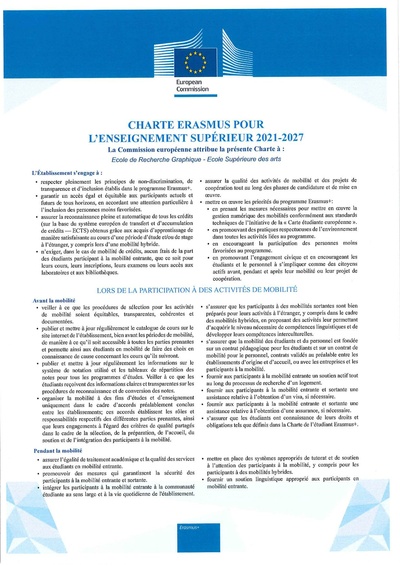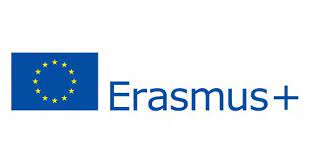International : Différence entre versions
De erg
(→°étudiant.e.s sortant.e.s / outgoing students) |
|||
| (9 révisions intermédiaires par 2 utilisateurs non affichées) | |||
| Ligne 1 : | Ligne 1 : | ||
===infos=== | ===infos=== | ||
| − | + | ===°[[erg fact sheet]]=== | |
| − | + | ===°[[Incoming students|incoming students]]=== | |
| − | + | ===°[[Étudiant.e.s sortant.e.s / Outgoing students|étudiant.e.s sortant.e.s / outgoing students]]=== | |
| − | + | ===°[[Mobilité du personnel académique|academic staff mobility]]=== | |
| − | + | ===°[[Partners|partners]]=== | |
| − | + | ===°[[Projets internationaux|international projects]]=== | |
| + | |||
| + | ===°[[Inclusive teaching at Erg|inclusive teaching at erg]]=== | ||
| + | |||
| + | ===°[[Erasmus Experience|experiences]] === | ||
| + | |||
| + | ===°[[Sammy Del Gallo|contact ]]=== | ||
| + | |||
| + | ===°[[Taux applicables|taux applicables]]=== | ||
| + | |||
| + | === °[[Green tips|green tips]]=== | ||
===statement on Erasmus international strategy=== | ===statement on Erasmus international strategy=== | ||
| Ligne 23 : | Ligne 33 : | ||
The development of skills adapted to the current and future context is also an essential objective. The economic growth mentioned in the European Area of Education desired by the European Commission should also be thought of in terms of exchanges, sharing, care, sustainability, respect for people and the environment, important values in the European Union. What artistic economies are possible? In the field of art, where teaching is considered open to the conception and application of new critical frameworks, tools of analysis and creative practices, we can imagine new forms of life, of growth in the sense of growing and not of surplus, of recycling, of objects and people in the sense of changing one's path. These new forms of life involve learning to be aware of and to use digital tools and social networks in a responsible manner. Our experience of a horizontal and digital school in recent months could learn from exchanges at a European level. Within the framework of Erasmus + we propose, among other things, to develop a digital platform for the exchange of content, courses, conferences and references, favouring the use of free software and licences to guarantee open access and respect for the authors. In addition, the digital development in free software can be shared, and serve as a '''common place of learning'''. | The development of skills adapted to the current and future context is also an essential objective. The economic growth mentioned in the European Area of Education desired by the European Commission should also be thought of in terms of exchanges, sharing, care, sustainability, respect for people and the environment, important values in the European Union. What artistic economies are possible? In the field of art, where teaching is considered open to the conception and application of new critical frameworks, tools of analysis and creative practices, we can imagine new forms of life, of growth in the sense of growing and not of surplus, of recycling, of objects and people in the sense of changing one's path. These new forms of life involve learning to be aware of and to use digital tools and social networks in a responsible manner. Our experience of a horizontal and digital school in recent months could learn from exchanges at a European level. Within the framework of Erasmus + we propose, among other things, to develop a digital platform for the exchange of content, courses, conferences and references, favouring the use of free software and licences to guarantee open access and respect for the authors. In addition, the digital development in free software can be shared, and serve as a '''common place of learning'''. | ||
| − | '''Thinking about the world and skills of tomorrow ultimately involves the dissemination and transnational experimentation of environmentally conscious and sustainable economic practices'''. Just as initiatives on gender and discrimination issues are local or European initiatives based on informal exchanges of common interests, one of our objectives in the framework of the Erasmus + programme is to be able to share and grow experiences, research, practices and references on recycling issues but also on the issue of short circuits and sustainability for food. Because the alternative economy, of proximity, of short circuit is not only that of recycling, we also experiment at the erg the creation of a cafeteria based on these same principles. The mobility of the teams and students involved in these issues will allow for the exchange of good practices and knowledge, particularly during internships. | + | '''Thinking about the world and skills of tomorrow ultimately involves the dissemination and transnational experimentation of environmentally conscious and sustainable economic practices'''. Just as initiatives on gender and discrimination issues are local or European initiatives based on informal exchanges of common interests, one of our objectives in the framework of the Erasmus + programme is to be able to share and grow experiences, research, practices and references on recycling issues but also on the issue of short circuits and sustainability for food. Because the alternative economy, of proximity, of short circuit is not only that of recycling, we also experiment at the erg the creation of a cafeteria based on these same principles. The mobility of the teams and students involved in these issues will allow for the exchange of good practices and knowledge, particularly during internships.<br> |
| − | |||
| − | - | + | [[Fichier:Charte EES erg 2022-2027.pdf |400px|thumb]] |
| − | [[Fichier: | + | [[Fichier:Logoerasmus+.jpg|no_frame]] |
| − | + | __NOTOC__ | |
Version actuelle datée du 15 avril 2024 à 14:07
infos
°erg fact sheet
°incoming students
°étudiant.e.s sortant.e.s / outgoing students
°academic staff mobility
°partners
°international projects
°inclusive teaching at erg
°experiences
°contact
°taux applicables
°green tips
statement on Erasmus international strategy
Since its creation in 1972, erg has defined itself as a place of research where the activation of modes and spaces of production leads the student to learn by doing. The articulation of the courses is a zone of convergence that gives rise to the unexpected, the exchange, the collective, the hybrid form, thus contributing to the training of artists- citizens in relation to the world, well beyond the training period. Participation in the Erasmus + programme will reinforce the international, transdisciplinary perspective of our practices and our pedagogy. The "modernisation" of our institution involves asking the question of the present. A present to be subjected to gender, colonial, environmental, economic and social analyses. The crisis that we are going through and will go through calls into question our tools, our means, the very idea of economic growth, and moreover "the health crisis is embedded in what is not a crisis but a lasting and irreversible ecological mutation" (Bruno Latour, April 2020). Our participation in the construction of a European space of education is to question, at all levels of school, and with our partners, the references and tools mostly used for teaching in art schools. We defend an artistic practice based on innovative and experimental thinking that situates its references and objects in a geopolitical context. No practice in an international and civic perspective is independent of its places, its form, its technique, its time, its links with other artists, arts and situations. The Erasmus + programme will allow us to develop this learning, and a conscious participation in these diverse realities.
One of the first objectives of participation in the Erasmus + programme is the development of social skills, adaptability, curiosity, encounter with the other, with other spaces, languages, practices. This objective is already in action at the erg in non-formal learning activities, in participation in the active life of the school. And also in the participation in activities of social cohesion, experimentation, in meeting places that allow both to promote intercultural understanding while acquiring relational and technical skills. These activities will also be places for sharing with our partners on digital platforms. Care for the other, respect for his or her culture is essential. How to welcome them? How can we avoid the traps of nationalism that are spreading in Europe? This is also one of the foundations in which we believe and which we will implement: the equitable sharing of knowledge and good practices and the aspiration to a more efficient, more fluid, fairer and more open education system.
Another objective is the learning of other references than those often dominated by the only western, male, majority representation. These references alone have a direct impact on who identifies with an artistic career. As a result, the origins of students in art schools are not very diverse, and ultimately diversity is not well represented in cultural institutions and in the teaching staff. Through the exchange of practices and knowledge made possible by the mobility of teachers and students supported by Erasmus +, the fight against discrimination begins in education. Our school is already aware of this, it organises seminars, working groups, exchanges of references but this often remains at a local level and/or at the level of a single school. These emancipatory practices could be supported transnationally and between schools. For example, it is as a result of teacher and student exchanges that this particular issue has become the subject of a Strategic Partnership project initiated in 2019: Teaching To Transgress Toolbox. The Erasmus+ programme will allow, among other things, to share the results of this Strategic Partnership and, above all, to extend the network of research, mobilisation on these issues and the implementation of inclusive pedagogies.
The development of skills adapted to the current and future context is also an essential objective. The economic growth mentioned in the European Area of Education desired by the European Commission should also be thought of in terms of exchanges, sharing, care, sustainability, respect for people and the environment, important values in the European Union. What artistic economies are possible? In the field of art, where teaching is considered open to the conception and application of new critical frameworks, tools of analysis and creative practices, we can imagine new forms of life, of growth in the sense of growing and not of surplus, of recycling, of objects and people in the sense of changing one's path. These new forms of life involve learning to be aware of and to use digital tools and social networks in a responsible manner. Our experience of a horizontal and digital school in recent months could learn from exchanges at a European level. Within the framework of Erasmus + we propose, among other things, to develop a digital platform for the exchange of content, courses, conferences and references, favouring the use of free software and licences to guarantee open access and respect for the authors. In addition, the digital development in free software can be shared, and serve as a common place of learning.
Thinking about the world and skills of tomorrow ultimately involves the dissemination and transnational experimentation of environmentally conscious and sustainable economic practices. Just as initiatives on gender and discrimination issues are local or European initiatives based on informal exchanges of common interests, one of our objectives in the framework of the Erasmus + programme is to be able to share and grow experiences, research, practices and references on recycling issues but also on the issue of short circuits and sustainability for food. Because the alternative economy, of proximity, of short circuit is not only that of recycling, we also experiment at the erg the creation of a cafeteria based on these same principles. The mobility of the teams and students involved in these issues will allow for the exchange of good practices and knowledge, particularly during internships.

